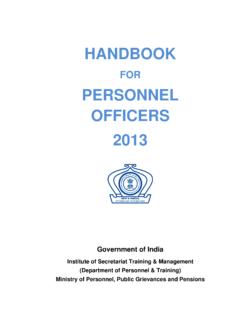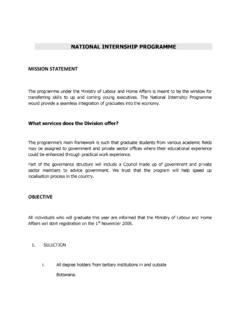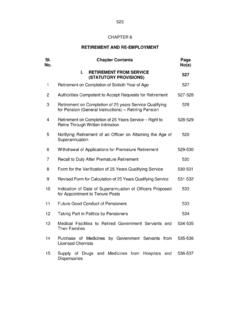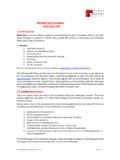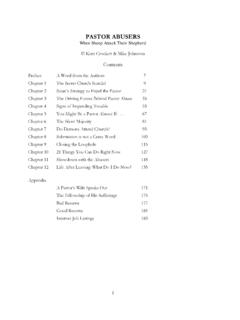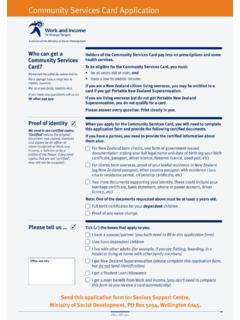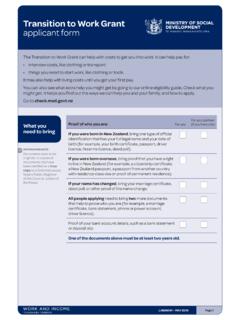Transcription of Case Name: Floralia Plant Growers Ltd. v. United …
1 Page 1 Case Name: Floralia Plant Growers Ltd. v. United Food and commercial workers international union , local 1518 (Vacation Pay Grievance) IN THE MATTER OF an Arbitration Between Floralia Plant Growers Ltd., Employer, and United Food and commercial workers international union , local 1518, union , (Vacation Pay Grievance) [2015] No. 135 No. X-021/15 British Columbia Collective Agreement Arbitration Surrey, British Columbia Panel: A. Paul Devine (Single Arbitrator) Heard: October 26, 28, November 6, and 10. Award: December 23, 2015. (99 paras.) Labour Arbitration -- Process and procedure -- Grievances -- Time for.
2 Labour Arbitration -- Employee rights and benefits -- Benefits -- Vacations and vacation pay. The union represented all employees of the employer, including temporary foreign workers hired under the federal Seasonal Agricultural Workers Program (SAWP). The collective agreement pro-vided the employer was to pay all employees a vacation allowance of four per cent of gross wages, increasing to six per cent after three consecutive years. On June 24, 2015 the union filed a grievance on behalf of all of its members employed by the employer. The grievance pertained to the payment of vacation pay to those employees in the SAWP who were entitled to receive the six per cent vaca-tion allowance.
3 The union told the employer that the grievance involved every member of the union who qualified for the increased vacation allowance since the first collective agreement was signed Page 2 between the parties in 2009. The position of the employer was that the grievance was out of time. The union sought an extension of time to bring the grievance on the basis that it would be inequita-ble to allow the employer to avoid its obligations. HELD: Grievance allowed. The seasonal farm workers in SAWP represented a vulnerable group, and their reluctance to bring forward complaints about payment of vacation pay was reflective of that vulnerability. A remedial extension of time under s.
4 89(e) of the Canada Labour Code was warranted in the circumstances. There was no dispute that the vacation pay grievance was substan-tially out of time given that the union now sought a remedy extending back over five years. The employer accepted that the employees who were represented in the grievance were entitled to six per cent vacation pay in 2013, although it resisted payment to them. The employees' undisputed en-titlement dated from 2012 forward. The grievance was allowed from 2012. Statutes, Regulations and Rules Cited: Labour Relations Code, s. 89(e), s. 104 AWARD INTRODUCTION: 1 The union is certified to represent all of the employees of the Employer.
5 Included in this cer-tification are temporary foreign workers hired under the federal Seasonal Agricultural Workers Program ("SAWP"). The Employer normally hires approximately 24 employees from Mexico under this program. As the name implies, employment under SAWP is seasonal, can run up to 8 months in a year but must end no later than December 15 of each year. Employees under the SAWP usually begin their employment with the or about February of each year, and normally leave some time in October. 2 Article of the 2012-2016 Collective Agreement between the parties provides the Em-ployer shall pay all employees a vacation allowance of 4% of gross wages, increasing to 6% after three consecutive years.
6 The payment is made to foreign workers on their last cheque at the end of a season or on their actual return home date whichever is the sooner. Article states that for the purposes of this Article, vacation pay shall be calculated based on the employee's seniority date. 3 Article 7 of the Collective Agreement deals with seniority. The Employer is required to maintain one seniority list which will identify employees as either foreign or domestic. It also pro-vides that the seniority of foreign workers in prior seasons is to be maintained notwithstanding the termination of their employment at the end of a season under the terms of the SAWP.
7 Their seniori-ty begins to accumulate from the previous seniority amount on the first day worked in the next sea-son. While this Article speaks of seniority by season, Article 21 provides that after three consecu-tive years, employees become entitled to 6% vacation pay payable to them on the last day of their seasonal employment. 4 On June 24, 2015 the union filed a grievance on behalf of all of its members employed by the Employer. The grievance pertained to the payment of vacation pay to those employees in the SAWP who were entitled to receive the 6% vacation allowance. In a clarifying email, the union explained Page 3 to the Employer that the policy grievance involved every member of the union who qualified for the increased vacation allowance since the first Collective Agreement was signed between the par-ties in 2009.
8 The position of the Employer is that the grievance is out of time in accordance with the provisions of the Collective Agreement. As well, during the arbitration the Employer took the posi-tion that the union had knowledge of the facts needed to advance its grievance but failed to act on those facts in a timely manner. 5 I was appointed under section 104 of the Labour Relations Code to hear and adjudicate on this dispute. OPENING REMARKS 6 As this is a union grievance, counsel for the union began by noting that the grievance arises under the two Collective Agreements, the first in 2009, and the second in 2012. All of the workers involved in the grievance are from Mexico.
9 The grievance deals with 10 employees who have been employed by the Employer since at least 2007. The records pertaining to the start dates of these em-ployees were provided as part of disclosure by the Employer prior to the start of the arbitration. The position of the union is that these employees would have first been entitled to receive the 6% vaca-tion allowance in 2010, which was the third year of their employment. Records indicate that the on-ly time the 6% vacation allowance was paid to these workers was in 2014. 7 The union submits that the affected employees are a vulnerable group as recognized by the courts and by several authorities including the BC Labour Relations Board.
10 The failure of these em-ployees to bring forward their grievances earlier is explainable because of their vulnerability. 8 As for as the timeliness argument is concerned, the union submits this is an ongoing griev-ance. Further, the union grieved as soon as it had a reasonable basis for doing so. In the alternative, I have the discretion to relieve against time limits under section 89(e) of the Labour Relations Code ("Code") under just and reasonable terms. It would be inequitable to allow the Employer to profit at the expense of a vulnerable group of employees. Further, there is no prejudice to the Employer to require it to pay what was required under the Collective Agreement.
